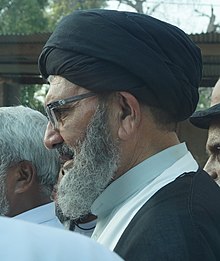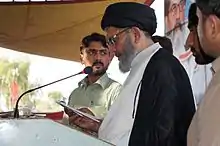Syed Sajid Ali Naqvi
Syed Sajid Ali Naqvi (Urdu: سید ساجد علی نقوی) is a Pakistani Shia Islamic scholar from Rawalpindi, Pakistan. He is the founder & leader of Islami Tehreek Pakistan also Patron-in-Chief of Shia Ulema Council. His main objective is to create an Islamic rule in the Pakistan.[1]
Syed Sajid Ali Naqvi | |
|---|---|
 | |
| Chairman of Islami Tehreek Pakistan | |
| Assumed office 2012 | |
| Preceded by | Position established |
| Patron-in-Chief of Shia Ulema Council | |
| Assumed office 1988 | |
| Preceded by | Arif Hussain Hussaini |
| Personal details | |
| Born | 1 January 1950 Rawalpindi, Pakistan |
| Nationality | |
| Political party | Islami Tehreek Pakistan |
| Other political affiliations | TJP/Islami Tehreek Shia Ulema Council |
| Residence(s) | Rawalpindi, Pakistan |
| Occupation | Islamic scholar & Politician |
Political history
Tehreek-e-Jafaria
He was also the head of one of the largest Shia Islam organizations in Pakistan the Tehreek-e-Jafaria. After a ban by 1995 regime, it continues to work under the name of Tehreek-e-Islami. Again the Tehreek-e-Islami was banned and a new party was formed with the name Shia Ulema Council. Naqvi also headed the religious wing of Tehreek-e-Islami i.e. the Shia Ulema Council. After the murder of Arif Hussain Hussaini in 1988, he was elected as the head of the Tehrik-e-Jafaria by the Supreme Council of Shiite clergy of Pakistan.[2]
Islami Tehreek Pakistan
He is currently the founder and leader of Islami Tehreek Pakistan.[3]
Arrest in a Criminal Case 2004

in 2004 Pervez Musharraf regime arrested the Naqvi in charge of Azam Tariq murder case the leader of Sipah-e-Sahaba, an Islamic extremist Anti-Shia Sunni Deobandi Islamist organization leader who was murdered in 2004[4] by a member of the Sipah-e-Muhammad a shia militant organization in revenge for the Quetta mosque attack and the massacre of more than 50 shia muslims by Sipah-e-Sahaba in 2003.[5] The Thousands of his supporters warned the government that they would besiege the federal capital if the government did not release Naqvi within the next few weeks. The demonstrators staged a rally in Islamabad on Sunday to protest the detention of Naqvi and the killing of Shiite leaders.
Naqvi was released on bail from the Adiala Jail on Saturday. The Golra Police arrested him on November 16, in connection with the Azam Tariq murder case. After rejection of his bail petition in a special anti-terrorist court, Naqvi's lawyers went to the high court, which ordered his release. Naqvi's sons and the Muttahida Majlis-e-Amal leaders received him and he was taken to his home under tight security.[6]
See also
References
- "Daily Times - Leading News Resource of Pakistan". www.dailytimes.com.pk. Archived from the original on March 19, 2007.
- "Daily Times - Leading News Resource of Pakistan". www.dailytimes.com.pk. Archived from the original on March 19, 2007.
- "Islami Tehreek Pakistan - ITP, Political Party Profile & Members Details". UrduPoint. Retrieved 2020-11-04.
- Sohail Mahmood (1995). Islamic fundamentalism in Pakistan, Egypt and Iran. Vanguard. p. 434. Retrieved 11 September 2012.
- Imtiaz Gul (Oct 8, 2003). "Cleric murder highlights sectarianism". Aljazeera.com. Archived from the original on April 24, 2017. Retrieved May 8, 2019.
- "Sajid Naqvi released". Archived from the original on 2016-03-03. Retrieved 2015-08-04.